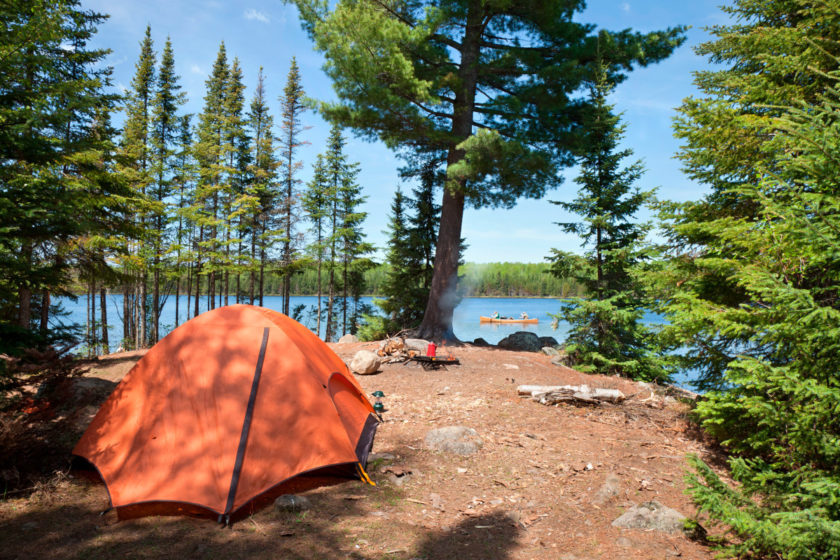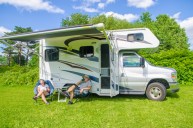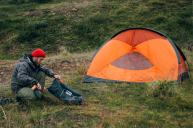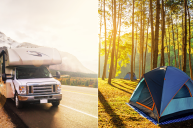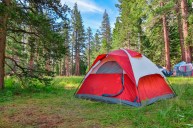As interest in the outdoors continues to soar, more and more people start to pack the campgrounds of our favorite National Parks and Forests. Even the State Parks are starting to get inundated with seemingly too many other campers. For those looking for a little peace and solitude, it may be time to consider going back to basics with primitive camping. While many modern facilities fill up fast during the prime months, many primitive campsites remain open through most of the year. The only real exception is the popular backcountry backpacking locations. And even when they are booked up, most of these sites are far enough away from your neighbor that they make for a much better experience.
Of course, primitive camping does come with its pros and cons. Many people are spooked off just because of the word "primitive" in the name. There is no doubt that "roughing it" in the wilderness may not be for everyone. However, when done right, it is one of the more amazing camping experiences one can have. It's cheap too, making it a prime activity for anyone on a limited budget. Let's look at what you need to know before your first primitive camping trip and how you can make the experience more pleasant.
What is Primitive Camping?
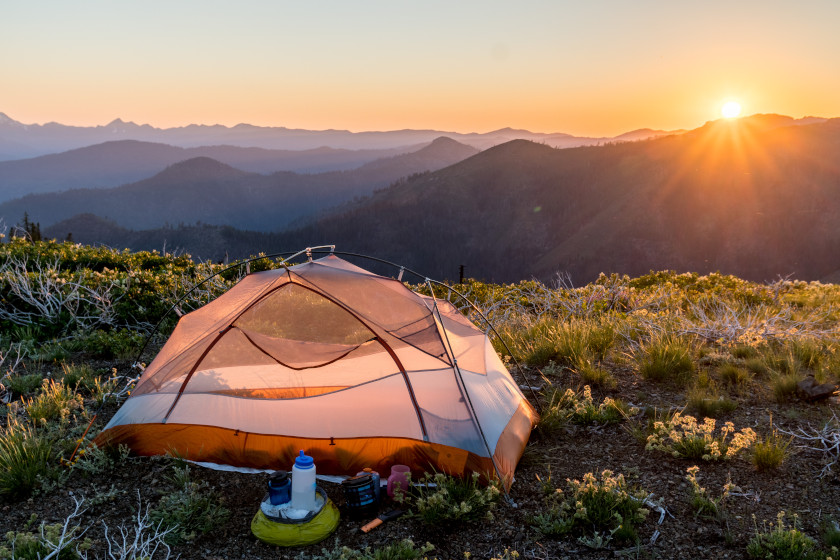
Ron Karpel via Getty Images
Camping takes on many different forms, and in truth there are all sorts of hybrids between the different types that have emerged over the years. However, most campers, and most parks define primitive camping as any that lacks hookups and access to modern restroom facilities, not even a vault toilet. There is no running water from a faucet or spigot anywhere, your nearest water source might be a natural lake or stream. Some campsites might have a picnic table or fire ring, but most are lacking even those. Many primitive camping areas are nothing more than a stake to mark where the site is, and some backcountry camping spots don't even have that.
Primitive campers are expected to adhere to "leave no trace" principles. That means you are bringing in all your own water, food, and other supplies. You also leave nothing behind when you leave, packing out all your trash with you for proper disposal in a garbage can at the parking lot or visitor's center later. Basically, primitive camping is simply camping at its most simplified. There's no electricity, and no modern facilities. On many hike-in expeditions, there is no cell service either.
While most people think of primitive camping as a backcountry experience, technically dispersed camping and dry camping from a vehicle could fall under the same umbrella since you are camped out on public lands without any sort or hookups or facilities.
What Do I Need for Primitive Camping?
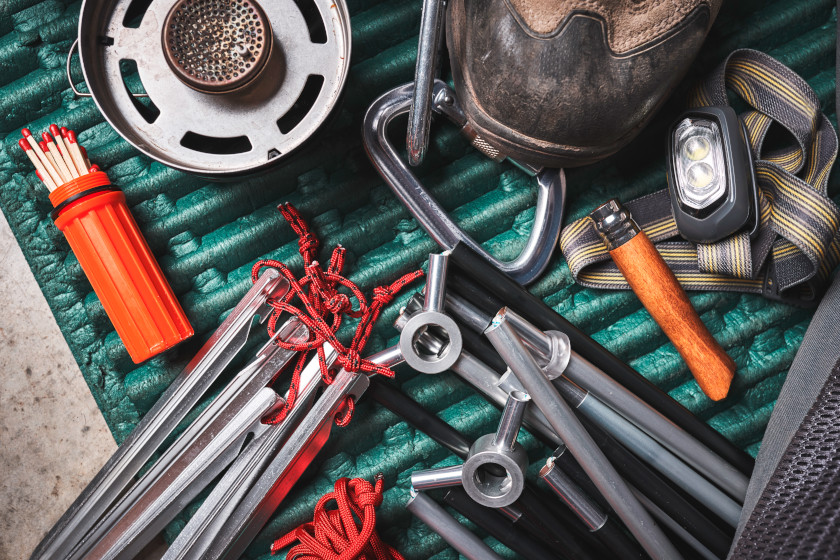
thegoodphoto via Getty Images
The great thing about primitive camping is that the essentials are rather simple and cheap. Odds are most serious hikers and casual car campers will already have gear that works for primitive camping in most state, National Forest, and Bureau of Land Management (BLM) areas. If you are hiking into a primitive campground, you may need to downsize your tent or sleeping bag to make it more comfortable to pack in. Other than that, here is our checklist of items to bring along.
- Tent
- Sleeping bag
- Compact pillow
- Sleeping pad
- Extra clothing
- Flashlight/lantern
- Hatchet/small axe
- First aid kit
- Medications
- Bug spray
- Food
- Water
- Trash bag
- Kitchen utensils (small and packable ones)
- Lighter/matches
- Small camp stove or grill (check regulations first)
- Pots/pans
- Biodegradable soap
- Biodegradable toilet paper
- Toothbrush/bathroom prodcuts
- Extra rope/cord
- Batteries
- Dry bags
- Towels
- Trowel
- Water purification tables/filtration system
Most of these items should be obvious. You can take things a step further and add a portable power station or a small solar panel to keep your cell phone charged. We know one of the main points of camping is to disconnect, but it's not a bad idea to have the phone available for emergencies.
We also highly recommend a personal locator beacon device. Something like SPOT that allows you to check in and relay your position in case of said emergency. If you need to stay connected, a satellite phone isn't a bad option either.
Keeping Clean and the Bathroom Element
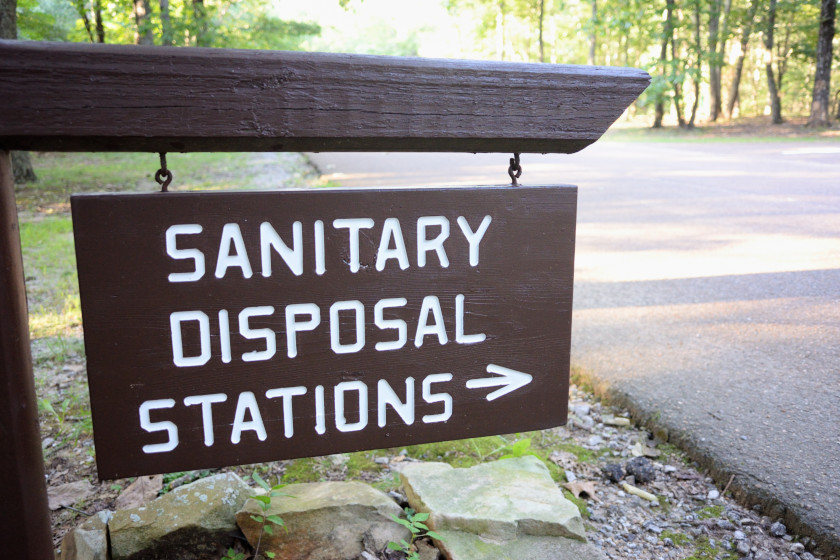
sshepard via Getty Images
For many people, the lack of showers and bathroom facilities is the dealbreaker. However, once you get past these hurdles, you'll find primitive camping a very pleasant experience. There's no getting around the unpleasant bathroom situation or lack thereof. You will need to take care of business in nature.
That's where the trowel and biodegradable toilet paper come into play. Because most primitive camping areas have strict rules on the disposal of human waste. You don't want to just go anywhere and leave it there. Think about the next group of campers who comes along, and you can imagine how things can quickly become a health risk.
Most primitive camping areas require you to dig a small hole to take care of business. This is known as the "cathole" method because you're essentially doing what a cat does. The U.S. Forest Service requires said holes to be at least six inches deep. They must also be at least 200 feet from all other campsites and water sources. Toilet paper must be taken with you, which is what the plastic trash bags are for. You pack it out and then dispose of it later in a trash can. Some areas may allow you to bury toilet paper but check the regulations first. We recommend a biodegradable toilet paper that will break down even faster than normal paper.
Some areas require nothing gets left behind due to a sensitive environment or people simply not following the rules in the past. In situations like that, we highly recommend the use of a WAG bag for packing waste out. This may be messy, but it's better for the environment. It also keeps the area nicer for the next people who use it.
Keeping yourself clean is a different type of challenge. Showers aren't exactly available. Most people use a lake or stream to wash up naturally. If you must use soaps, biodegradable options are best for nature. Even then, most wildlife agencies don't recommend using them in a river, lake, or stream. The better option might be to use wet camping wipes. These do an excellent job of cleaning the dirt, oil, and grime off your skin, making it easier to be comfortable and sleep at night. The downside is you need to pack these sorts of wipes out and dispose of them afterwards. Another option is to take dry shower or body wash products to help keep clean, although the containers for these will also need to be packed out and disposed of properly at the end of the trip.
Is Primitive Camping Safe?
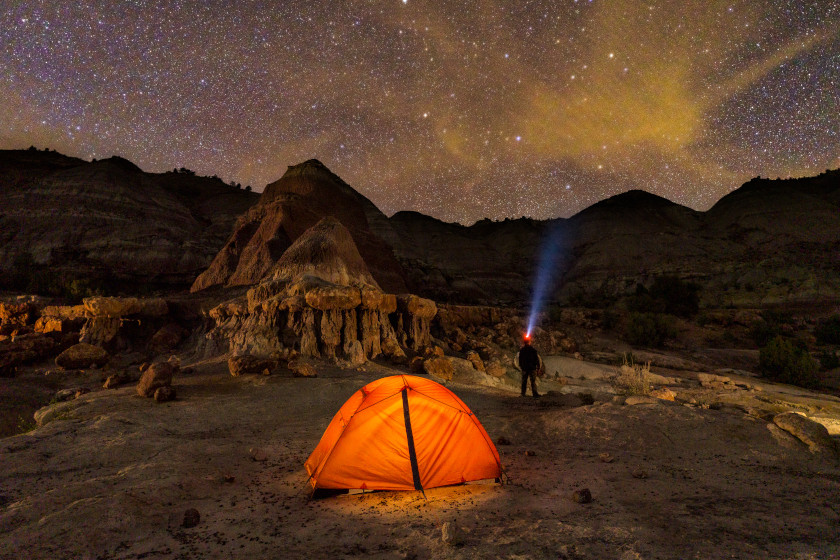
Adventure Photo via Getty Images
Many people seem to have a misconception that camping primitively is unsafe. We think it's mostly due to the reputation for some (not all) dispersed camping sites for sometimes being gathering spots for homeless people. While that sometimes happens, it's not the case everywhere. It pays to research the area you are planning to camp ahead of time. There are almost always online reviews or videos about different primitive camping areas that will indicate the worthiness of the spot before you go.
Other than dangers from humans, primitive camping is no more hazardous than other forms of camping. Look for dead trees and limbs that could be knocked over in a stiff wind and fall on your tent. Be wary of low areas that could be susceptible to flash flooding. Know the rules on campfires for the area you're staying. Follow burn bans if they are in effect because they are usually there due to extreme wildfire danger. You don't want to be responsible for sparking one of those.
Follow all wildlife and bear safety guidelines. Store food in scent-free containers and suspend it in a tree a safe distance from your tent. Proper food storage goes a long way to keep a wayward bruin or other animal from discovering and rummaging through your camp.
If you are planning a serious trip in the backcountry, we recommend always going with at least one other person. If you've never done a trip like that before, take along an experienced friend to show you the ropes. If you start researching rescues of primitive campers from the wilderness, you'll often find the stories involve people who went out ill-prepared for that type of expedition.
Going out and camping without all the comforts of home can be a little intimidating to a first-time primitive camper. The best way to get over that fear is simply to go out and do it. Once you've slept a night under a beautiful canopy of stars far from civilization in the quiet of nature, you'll understand why the concept is so appealing to many people. Once you go once, we have no doubt you'll come back wanting to enjoy more of nature's beauty and solitude.
For more outdoor content from Travis Smola, be sure to follow him on Twitter and Instagram For original videos, check out his Geocaching and Outdoors with Travis YouTube channels.
